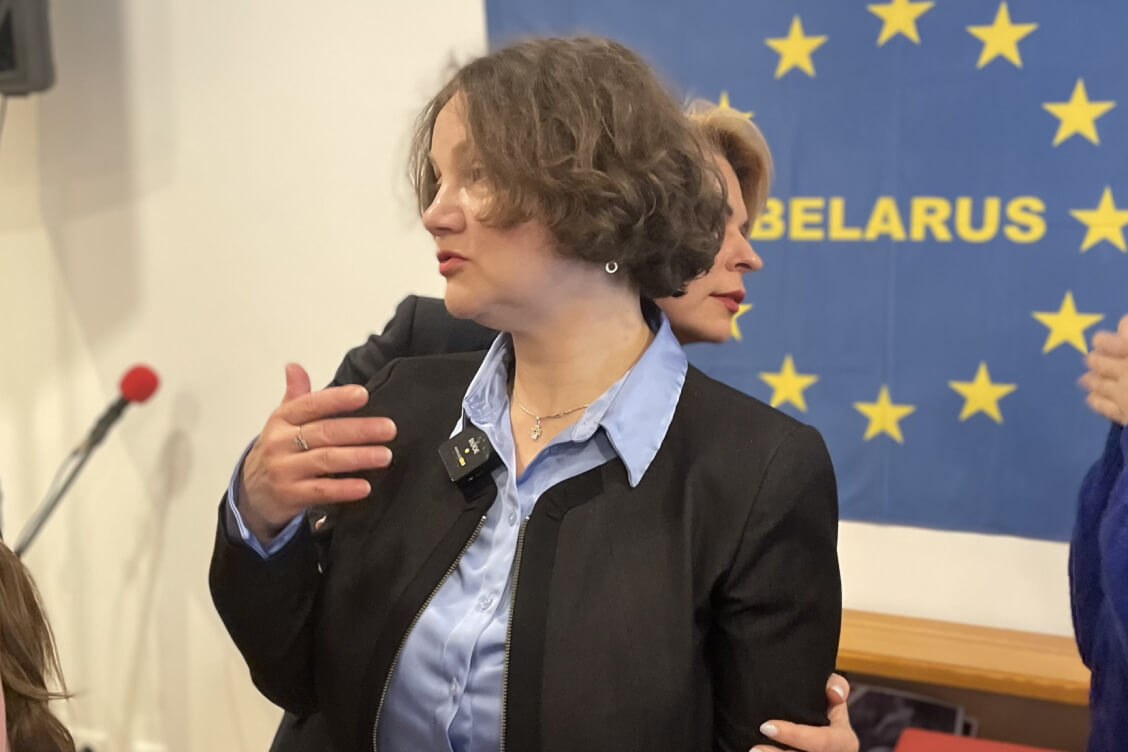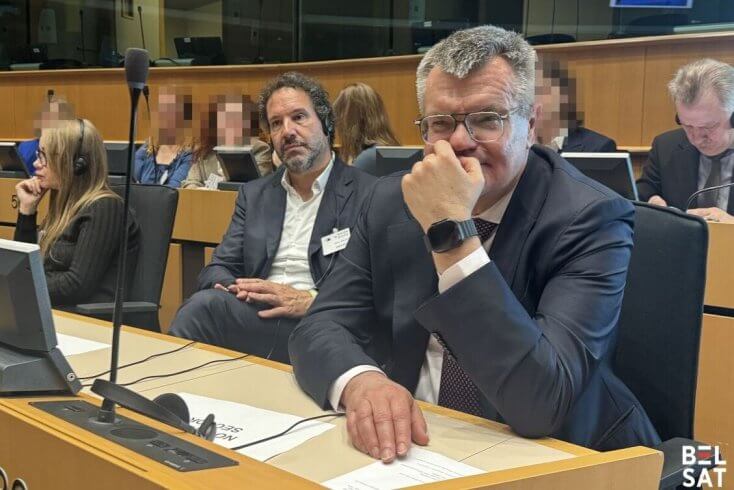Šarenda-Panasiuk says pledge to snitch is part of prisoner release process

February 10, Pozirk. Palina Šarenda-Panasiuk, an opposition activist released from a penal colony on February 1 after serving three terms added to her original sentence, has held a news conference in Vilnius to tell journalists about the ill-treatment of political prisoners.
She said that security officers often force inmates to sign of a written pledge to act as an informer if they want to be considered for pardon.
“They start torturing a person, and then at a certain point, they come and ask her to write [a petition] for pardon,” she said. “If the person does not give in, they keep torturing her.”
By torture she means long periods inmates spend in punishment cells (SHIZO) and the internal prison (PKT).
“‘If you don’t write it, you will not get out of prison; you will not see your children; your children will grow up without you.’ These are the words that I heard from Department of Corrections officers,” she added.
“When a person has been forced to write a petition for pardon, an interview [for Belarusian state television propaganda broadcasts] is often the final stage to finally break down and discredit the person, as they think. To make sure a person leaves Łukašenka’s GULAG in fear and cannot even think about any politics, they force her to sign a pledge on confidential cooperation.”
She admitted to giving written pledges to cooperate because he feared she would never be released. “I wrote the first paper at [Zarečča’s] Penal Colony No. 24 on December 24 [2024] and the second one in Brest, when I reported to the Main Directorate for Combating Organized Crime and Corruption [HUBAZiK]. It was February 3. The next day I left [the country],” Šarenda-Panasiuk said.
She said that these pledges were a “tactical move” and that she takes her promises back.
“I have heard that many political prisoners were forced to do it,” the activist continued. “I call on all those who have wisdom to publicly refute and disavow this pledge too. By doing so, we are snatching the weapon from the hands of these executioners.”
In her opinion, humiliation and intimidation is part of the release process: it is not enough for officers to torture someone, ruin her health and break her down; they seek to force political prisoners to betray their ideals.
Security agents give snitchers code names. “I will reveal mine—Edelweiss. That is, you must snitch on sentiment among the colony’s inmates, especially during elections,” she explained.
Speaking about the punishment cell, she said it was “just an empty room with absolutely nothing in it.”
“They give you some uniform . . . it can be too small: the jacket doesn’t button up, and the skirt is like from a hooker . . . . If they lock you up for a month, you cannot change this uniform; you walk and sleep in it,” she said. “The light is on all night. Hot water is on 20 minutes a day. The toilet is open. You relieve yourself under a CCTV camera . . . . It is a total deprivation of fresh air and sunlight. . . . There are no mattresses, just bare boards. You cannot sleep at night because it’s wet and cold.”
Šarenda-Panasiuk was in detention since January 3, 2021.
Six months after her arrest, a Brest court sentenced her to two years in prison for violence against a police officer and insults against the head of state and an official.
Later, she was found guilty of disobeying prison authorities and had her prison term extended three times. Judges additionally sentenced her to three years and one day behind bars. She served her sentence in full.

Former prisoner Šarenda-Panasiuk opposes talks with Łukašenka, calls him "Russian puppet"
- Politics, SecurityOpposition politician Capkała in Washington proposes a “Venezuela” solution for BelarusThe material is available only to POZIRK+
- SocietyWomen dominate Belarus’ workforce with growing presence in ITThe material is available only to POZIRK+
- Economy
- Politics
- Politics, Society
- Security, SocietyBiełavija operating evacuation flights from DubaiThe material is available only to POZIRK+
- Politics
- Politics, SecurityPoland extends no-go zone at Belarus border for another 90 daysThe material is available only to POZIRK+
- EconomyRyžankoŭ seeks to boost Belarus-Ghana ties during two-day visitThe material is available only to POZIRK+
- PoliticsReprisals: dissident woman on non-custodial sentence diesThe material is available only to POZIRK+
- Politics
- PoliticsBelarus’ former presidential hopeful Capkała meets with US national security advisorThe material is available only to POZIRK+
- PoliticsEuropean Parliament hosts Belarus Cross-Party ForumThe material is available only to POZIRK+
- PoliticsKGB designates PEN Belarus as extremist groupThe material is available only to POZIRK+
- Society
- EconomyBelGee’s car sales up 41 percent, LADA down 13 percent in FebruaryThe material is available only to POZIRK+
- PoliticsUN rights council to hold informal discussions on BelarusThe material is available only to POZIRK+
- EconomyPakistan takes down Belarus construction jobs after no one applied for four monthsThe material is available only to POZIRK+
- Politics, SocietyBelarus to put another suspected dead Nazi war criminal on trialThe material is available only to POZIRK+
- Politics, SecurityOfficials inspecting CBRN brigade in Staryja DarohiThe material is available only to POZIRK+



